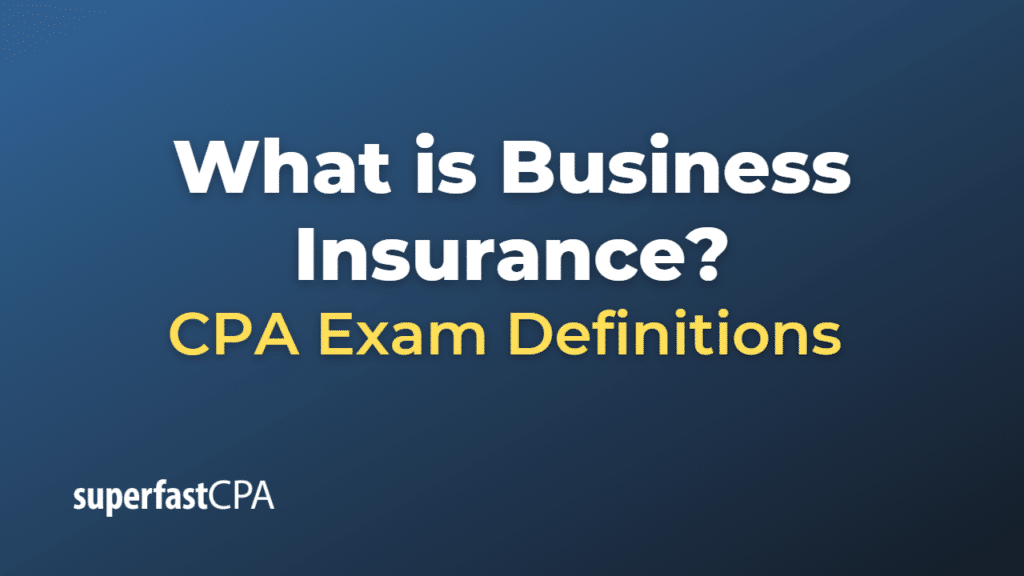Business Insurance
Business insurance refers to a range of insurance policies designed to protect a business, its owners, and its employees from potential financial losses resulting from unforeseen events or circumstances. These policies cover various risks and liabilities that a business might face during its normal operations. The type and extent of coverage depend on the specific needs of the business, its industry, and the level of risk involved in its operations.
Some common types of business insurance include:
- General liability insurance: Covers a business for bodily injury, property damage, or personal injury claims resulting from its operations, products, or services. This is often considered a foundational policy for businesses.
- Professional liability insurance: Also known as errors and omissions (E&O) insurance, this covers a business against claims arising from negligence or failure to provide professional services as expected, causing financial loss to clients or third parties.
- Property insurance: Protects a business’s physical assets, such as buildings, equipment, and inventory, from damage or loss due to events like fire, theft, or natural disasters.
- Workers’ compensation insurance: Covers medical expenses, lost wages, and other costs related to work-related injuries or illnesses suffered by employees. This type of insurance is generally required by law in most jurisdictions.
- Commercial auto insurance: Provides coverage for vehicles owned or used by a business, protecting against liability and property damage in the event of an accident.
- Business interruption insurance: Helps a business cover lost income and additional expenses in case its operations are disrupted due to events like natural disasters or equipment breakdowns.
- Cyber liability insurance: Covers a business’s financial losses resulting from data breaches, cyberattacks, or other cyber-related incidents.
- Directors and officers (D&O) insurance: Protects the personal assets of a company’s directors and officers against claims arising from their actions or decisions made on behalf of the business.
These are just a few examples of the many types of business insurance policies available. A business should carefully assess its specific risks and needs to determine the appropriate coverage.
Example of Business Insurance
Let’s consider a fictional small bakery called “Sweet Treats” as an example to understand how different types of business insurance can be relevant.
- General liability insurance: A customer slips on a wet floor inside Sweet Treats and suffers a broken arm. The general liability insurance would cover the customer’s medical expenses and any legal fees if they decide to sue the bakery for negligence.
- Professional liability insurance: Sweet Treats is hired to make a wedding cake, but the cake collapses during the event due to a structural error. The couple sues Sweet Treats for damages. Professional liability insurance would help cover the legal defense costs and any settlement or judgment.
- Property insurance: A fire breaks out in the bakery, causing significant damage to the building and destroying the baking equipment. Property insurance would cover the cost of repairing the building and replacing the equipment.
- Workers’ compensation insurance: An employee at Sweet Treats suffers a severe burn while working with the oven. Workers’ compensation insurance would cover their medical expenses, rehabilitation costs, and a portion of their lost wages during recovery.
- Commercial auto insurance: Sweet Treats uses a delivery van to transport baked goods to customers. If the van is involved in an accident, commercial auto insurance would cover the damages to the van and any potential liability for injuries or property damage.
- Business interruption insurance: Due to the fire mentioned earlier, Sweet Treats must close its doors for two months for repairs. Business interruption insurance would help cover the lost income and additional expenses incurred, such as renting a temporary location.
- Cyber liability insurance: Sweet Treats’ online ordering system is hacked, and customer credit card information is stolen. Cyber liability insurance would cover the costs of notifying customers, offering credit monitoring services, and any legal fees or fines resulting from the breach.
- Directors and officers (D&O) insurance: The bakery’s directors are sued by a supplier for breach of contract. D&O insurance would protect the personal assets of the directors by covering legal defense costs and any settlement or judgment.
In this example, having a comprehensive set of business insurance policies would help protect Sweet Treats from financial losses and liabilities arising from various risks it faces in its day-to-day operations.













